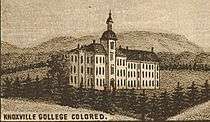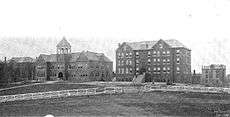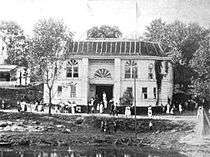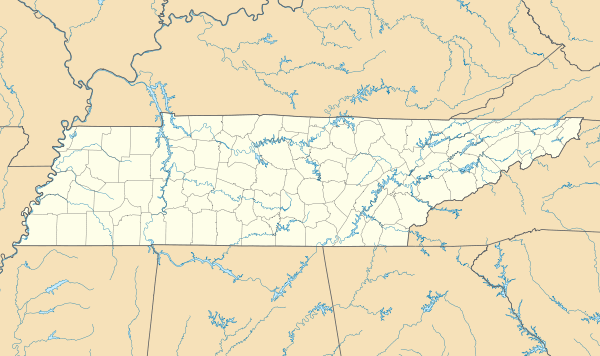Knoxville College
 | |
| Motto | Let There Be Light |
|---|---|
| Type | Private, HBCU |
| Established | December 16, 1875 |
| Affiliation | Presbyterian Church (U.S.A.) |
| Endowment | $1 million (appx.)[1] |
| Chairman | James Reese[2] |
Academic staff | 35[3] |
| Students | 11[4] |
| Location |
Knoxville, Tennessee, United States 35°58′12″N 83°56′45″W / 35.97000°N 83.94583°WCoordinates: 35°58′12″N 83°56′45″W / 35.97000°N 83.94583°W |
| Campus | Urban, 39 acres (16 ha) |
| Colors | Garnet and blue |
| Nickname | Bulldogs |
| Website | www.knoxvillecollege.edu |
Knoxville College is a historically black liberal arts college in Knoxville, Tennessee, United States. Founded in 1875 by the United Presbyterian Church of North America, the school has an enrollment of 11 students. Knoxville College is a United Negro College Fund member school. In May 2015, the College suspended classes until Fall 2016 term in hopes of reorganizing its financial issues.
History
Establishment
Knoxville College is rooted in a mission school established in Knoxville in 1864 by R. J. Creswell of the United Presbyterian Church to educate the city's free blacks and freed slaves.[5] This school initially met in the First Baptist Church building (which at the time was located on Gay Street) before moving to a permanent facility in East Knoxville in 1866.[5] In spite of general apathy from the city's leaders and threats from poor whites, the school's enrollment gradually grew to over 100.[5]

In the 1870s, the church's Freedmen's Mission, which had established mission schools for freed slaves across the South, decided to refocus its efforts on building a larger, better-equipped school in Knoxville, in part due to stiff competition from other denominations in Nashville.[5] In 1875, the church sold its East Knoxville property and purchased its current property, which at the time consisted of a hill that had been occupied by a Confederate battery during the Civil War.[6] The school's first building, McKee Hall, named for the Reverend O.S. McKee, was completed in 1876, and the school opened in December of that year.[5] Former governor William G. Brownlow and gubernatorial candidate William F. Yardley spoke at the opening ceremonies.[7]
The Reverend J. S. McCulloch was named the school's first principal, and Eliza B. Wallace was named the school's principal of female students.[5][8] The new school was primarily a normal school, which trained teachers, but also operated an academy for the education of local children. In 1877, the school was designated a college by the state, to the surprise of McCulloch, as few of the school's students were ready for a college-level curriculum.[5] In 1890, the state designated the school the recipient of its Morrill Act funds for blacks, with which the school established mechanical and agricultural departments.[9]
Early 20th century growth

In 1901, Knoxville College finally received a charter from the State of Tennessee.[5] Six years later, the school established the Eliza B. Wallace Hospital, which served a dual purpose of training nurses and tending to the health needs of the local black community. This proved invaluable during the city's Influenza outbreak of 1918.[5] In 1913, John Henry Michael, the head of the school's mechanical department, designed the "Negro Building" for the National Conservation Exposition, which was held across town at Chilhowee Park.[10] The building, which is no longer standing, was constructed with the help of Knoxville College students.

During World War I, Knoxville College students helped raise money for liberty bonds and the Red Cross.[5] In the aftermath of the Riot of 1919, one of the city's worst racial episodes, the school's administration (comprising black and white members) staunchly defended the city's African American community, and praised its students' restraint.[5] In 1925, Knoxville College students staged a month-long boycott of classes to protest the school's strict behavioral code, culminating in an all-night negotiating session between student leaders and the school's dean, Herbert Telford. Telford agreed to relax some rules, and allowed the creation of a student council.[5]
In 1957, Knoxville College became one of the first group of predominantly black institutions admitted to full membership in the Southern Association of Colleges and Schools (SACS).[9] Throughout the summer of 1960, Knoxville College students engaged in a series of sit-ins to protest segregation at lunch counters in downtown Knoxville, eventually convincing most downtown businesses to end the practice.[11] The school's charter was amended in 1962 to allow the admission of white students.[5]
Accreditation loss and reorganization
Beginning in the 1970s, Knoxville College began to struggle financially, leading to a gradual decline. In 1997, the Southern Association of Colleges and Schools withdrew Knoxville College's accreditation, and the school's financial situation became dire.[1] As enrollment plummeted, the school's debt skyrocketed, and it was unable to pay its faculty or electric bills. In August 2005, the school's Board of Trustees fired the school's president, Barbara Hatton.[1]
Following Hatton's removal, the school's alumni association embarked on an aggressive fundraising campaign, aided by Oak Ridge National Laboratory scientist Johnnie Cannon, and the school has gradually rebounded.[1] In January 2010, the school hired Dr. Horace A. Judson as interim president. Judson implemented a new strategic plan with the following goals: (1) regain accreditation, (2) achieve fiscal stability, (3) develop academic program distinctiveness, (4) develop a department of enrollment management, (5) develop a quality student-centered living and learning environment, and (6) establish new relationships and strengthen former ones among key constituents.[12]
In subsequent years, the college continued to struggle. On June 9, 2014, the Environmental Protection Agency seized control of A.K. Stewart Science Hall to conduct an emergency clean-up of toxic chemicals that the college had improperly maintained in an abandoned laboratory.[13] In April 2015, the school announced it was suspending classes for the Fall 2015 term in hopes of reorganizing. Enrollment had dwindled to just 11 students, and the college was struggling to pay back a $4.5 million loan from 2003 and more than $425,000 to the federal government for the Stewart Science Hall cleanup.[2] In May 2015, the school announced classes would be suspended until the Fall 2016 term.[14]
In May 2016, the Tennessee Department of Environment and Conservation recommended the college become a state Superfund site due to ongoing contamination concerns from the Stewart Science Hall.[15]
Campus
|
Knoxville College Historic District | |
|
McKee Hall | |
  | |
| Area | 14.5 acres (5.9 ha) |
|---|---|
| NRHP Reference # | 80003841 |
| Added to NRHP | May 1, 1980 |
Knoxville College is situated on a 17-building, 39-acre (16 ha) campus, located atop a hill overlooking the Mechanicsville neighborhood, just northwest of Knoxville's downtown area. Along with administration and classroom buildings, the campus includes a performing arts center, a gymnasium, a library, a chapel, and a student center. The school maintains dormitories for on-campus students, as well as a president's house, and cottages and apartments for faculty.[16]
Knoxville College Historic District
In 1980, eight buildings on the Knoxville College campus were listed on the National Register of Historic Places as a historic district for their role in minority education.[17] Many of the earliest buildings were constructed using student labor, student-made bricks, and lumber donated by alumni.[18] The district includes the following buildings:
- McKee Hall, the oldest building on campus, originally built in 1876, largely rebuilt in 1895 following a fire. The building is named for the Reverend O.S. McKee, who had established the first school for African-American children in Nashville in 1862. This building currently houses administration offices.[19]
- The President's House, built in the late 1880s. The house was originally built of wood, but brick siding was added in 1905.[19]
- Wallace Hall, built in 1890 as an orphanage.[19] This building is named for Eliza B. Wallace, the school's principal of female students, 1877–1897.
- Elnathan Hall, built in 1898 following the destruction by fire of the original Elnathan Hall, and altered in 1905 and 1971. This building has served variously as a women's dorm, administration building, and classroom building.
- Two Faculty cottages, 1005 and 1009 College Street, both built in the Bungalow style in 1906.[19]
- McMillan Chapel, built in 1913, designed by Knoxville College alumnus, William Thomas Jones. Along with church services, the chapel served as the campus's primary performance venue. Notable guests who have delivered speeches at the chapel include George Washington Carver, Countee Cullen, W. E. B. Du Bois, Jesse Owens, William H. Hastie and Jackie Robinson.[20]
- Giffen Memorial Gymnasium, built in 1929.[19]
In 2016, the preservationist group Knox Heritage placed the Knoxville College Historic District on its "Fragile Fifteen," a list of endangered Knoxville-area historic properties.[21]
Administration
A 20-member Board of Trustees oversees Knoxville College. Its chairman is Rev. James Reese.[2] The board includes three faculty representatives and one student representative.[3]
The Board of Trustees appoints the president, who is the school's chief administrator. The most recently appointed president, Jacob Savage, was fired by the Board of Trustees on January 23, 2015, three months after he had been hired to replace Evelyn Hallman. He had agreed to take no salary for his position.[2] The president is assisted by the chief operating officer, academic dean, dean of students, director of admissions, development officer, athletic director, and the Center for Public Health director.[3]
Academics
As of 2010, Knoxville College offered two degrees: the four-year Bachelor of Liberal Studies, and the two year Associate of Arts. The Bachelor of Liberal Studies includes one of four areas of concentration: Humanities, Business and Computer Sciences, Natural Sciences and Mathematics, or Social and Behavioral Sciences.[3] The curriculum further requires 15 to 18 semester hours of specialization within each concentration, providing for a more in-depth understanding of a particular field.[3]
Knoxville College follows a debt-free policy that allows students to complete the degree program without the accumulation of debt. This is accomplished primarily through its College Work Program, which allows students to offset much of their tuition costs by working for several hours per week. This program involves a mix of performing various tasks around campus, community involvement, and internship programs.[3]
Student life

Knoxville College's Student Government Association (SGA), which is elected by the student body, acts as a liaison between students and campus administration. The SGA is led by a president, elected for one term.[22]
Student activities include a dance team, a debate team, a choir, and a trivia team (which competes with other HBCUs in the Honda Bowl Competition). The school's newspaper, The Aurora, has been published for over a century. The college also maintains a student ambassador program and wellness program that provides volunteer services for the surrounding community.[22]
Knoxville College has dropped most athletics programs in recent years, but is currently in the process of re-establishing men's and women's basketball teams, as well as a cheerleading squad.[22]
Notable alumni
| Name | Class year | Notability | Reference(s) |
|---|---|---|---|
| James Garfield Beck | 1906 | philanthropist who was influential in the black community in Knoxville, Tennessee | |
| William Coffee | cryptographer | ||
| George E. Curry | editor-in-chief of the National Newspaper Publishers Association news service (NNPA) and BlackPressUSA.com, and is chairman of the Board of Trustees at Knoxville College | ||
| Dr. Michael Eric Dyson | attended, but transferred | Professor of sociology at Georgetown University, author, media commentator, talk radio show host | |
| C. Virginia Fields | 1967 | social worker and former Borough President of Manhattan, New York | |
| Johnny Ford | Mayor of Tuskegee, Alabama | ||
| Jake Gaither | 1927 | Legendary Florida A&M University football coach who won more than 85 percent of his games over a 24-year period, from 1945 to 1969. Member of College Football Hall of Fame | |
| Grady Jackson | former defensive tackle in the National Football League | ||
| Vernon Jarrett | first African-American columnist for the Chicago Tribune and former president of the National Association of Black Journalists (NABJ) | ||
| Ken Johnson | former defensive end in the National Football League | ||
| Lyman T. Johnson | educator and influential leader of racial desegregation in the state of Kentucky during the 1940s | ||
| Dr. Edith Irby Jones | first female president of the National Medical Association | ||
| Barbara Rodgers | former anchor for KPIX TV in San Francisco | ||
| Ralph Wiley | noted author, speaker, and sports columnist for The Oakland Tribune, Sports Illustrated, and ESPN | ||
| Palmer Williams, Jr. | actor, star of Tyler Perry's House of Payne |
References
- 1 2 3 4 Reginald Stuart, Knoxville College Still in the Dark But Seeing Light, 28 April 2009. Retrieved: 7 April 2011.
- 1 2 3 4 Megan Boehnke, "Knoxville College to Suspend Fall Classes," Knoxville News Sentinel, 13 April 2015.
- 1 2 3 4 5 6 Knoxville College Catalog, 2008-2010. Retrieved: 7 April 2011.
- ↑ Peter Jacobs, , Business Insider, 15 April 2015.
- 1 2 3 4 5 6 7 8 9 10 11 12 13 Cynthia Fleming, "Knoxville College: A History and Some Recollections of the First Fifty Years," East Tennessee Historical Society Publications, Vol. 58-59 (1986-1987), pp. 89-111.
- ↑ Digby Gordon Seymour, Divided Loyalties: Fort Sanders and the Civil War in East Tennessee (Knoxville, Tenn.: University of Tennessee Press, 1963), p. 108.
- ↑ East Tennessee Historical Society, Lucile Deaderick (ed.), Heart of the Valley: A History of Knoxville, Tennessee (Knoxville, Tenn.: East Tennessee Historical Society, 1976), p. 41.
- ↑ East Tennessee Historical Society, Mary Rothrock (ed.), The French Broad-Holston Country: A History of Knox County, Tennessee (Knoxville, Tenn.: East Tennessee Historical Society, 1972), pp. 318-319.
- 1 2 Lois Clark and Lowell Giffen, "Knoxville College," An Encyclopedia of East Tennessee (Oak Ridge, Tenn.: Children's Museum of Oak Ridge, 1981), pp. 274-275.
- ↑ Dreck Wilson Spurlock, African-American Architects: A Biographical Dictionary, 1865-1945 (New York: Routledge, 2004), p. 16.
- ↑ Merrill Proudfoot, Diary of a Sit-In (Chapel Hill, N.C.: University of North Carolina Press, 1962).
- ↑ Horace Judson, President's Update, Knoxville College Today, 28 March 2010. Retrieved: 7 April 2011.
- ↑ "Federal Agencies Begin Cleaning Up Hazardous Materials at Knoxville College Lab Building," WATE.com, 9 June 2014.
- ↑ "Knoxville College Suspends Classes Until Fall 2016," Knoxville News Sentinel, 5 May 2015.
- ↑ S. Heather Duncan, "Knoxville College's Environmental Problems Complicate Redevelopment Plans," Knoxville Mercury, 8 June 2016.
- ↑ Knoxville College - Campus Map. Retrieved: 8 April 2011.
- ↑ Nationalregisterofhistoricplaces.com - Knox County Historic Districts. Retrieved: 8 April 2011.
- ↑ A Brief History of Knoxville College. Retrieved: 8 April 2011.
- 1 2 3 4 5 Nancy Curtis, Black Heritage Sites: The South (Nancy C. Curtis, 1996), pp. 222-223.
- ↑ Robert Booker, "Spotlight on Knoxville College's McMillan Chapel Again," Knoxville News Sentinel, 28 May 2013. Retrieved: 28 May 2013.
- ↑ Coury Turczyn, "Knox Heritage Announces the 2016 'Fragile Fifteen'," Knoxville Mercury, 16 May 2016.
- 1 2 3 Knoxville College - Campus Organizations. Retrieved: 8 April 2011.
External links
| Wikimedia Commons has media related to Knoxville College. |
